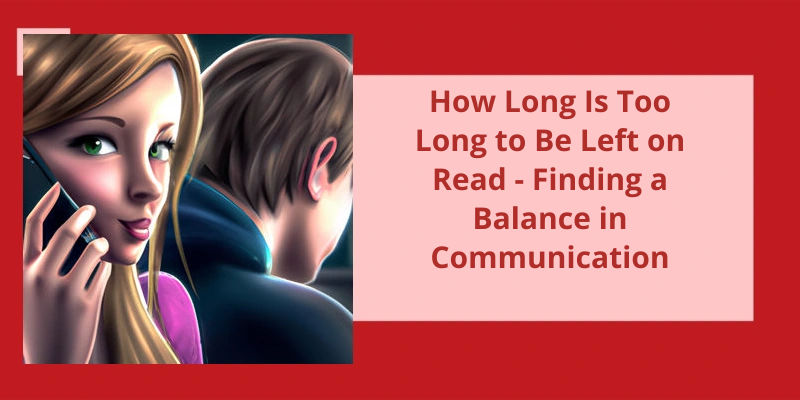We all have that one friend who always seems to be too busy to hang out. It can be frustrating and can make us feel undervalued or neglected. While it may seem like their constant busyness is a reflection of how they view the friendship, it’s important to understand that people have different priorities and commitments. It’s crucial that we respect their time and find ways to work around their schedule. In this article, we will explore various ways to deal with a busy friend, including offering to plan ahead, setting up a regular schedule, and understanding that friendships evolve over time. By implementing these strategies, we can maintain the friendship while also respecting our friend's busy schedule.
How Do I Deal With My Partner Being Too Busy?
Be understanding and patient with your partners busy schedule, but also express your needs and desires for quality time together. Plan ahead and make specific arrangements for dates or activities that fit both of your schedules. It can be helpful to find common interests or hobbies to share with your partner, so that you can spend meaningful time together while doing something you both enjoy.
Try not to take your partners busyness personally or as a reflection of their feelings towards you. Remember that your partners work or other obligations aren’t a reflection of how they feel about your relationship. It may also be helpful to remind yourself of your own busy schedule or interests, and to respect your partners need for space and time to focus on their own priorities.
If you find yourself feeling neglected or disconnected from your partner despite your efforts to make time together, consider seeking support from a therapist or counselor. A professional can help you navigate the challenges of a busy relationship and offer guidance for improving communication, managing expectations, and finding balance.
Ultimately, the key to dealing with a partner who’s too busy is to approach the situation with patience, communication, and a willingness to compromise. By working together to find ways to make time for each other, you can strengthen your relationship and deepen your connection despite lifes competing demands.
Tips for Balancing Busy Schedules in a Long-Distance Relationship
- Communicate regularly – Make sure to set aside time each day to talk to your partner, even if it’s just for a few minutes. This will help you stay connected despite the distance.
- Set realistic expectations – Be honest about your schedule and don’t make promises you can’t keep. It’s better to under-promise and over-deliver than the other way around.
- Plan ahead – Use calendars and scheduling tools to coordinate your schedules in advance. This will help you avoid conflicts and make the most of your time together.
- Find creative ways to stay connected – Send care packages, surprise gifts, or plan virtual dates to keep the romance alive.
- Make time for self-care – It’s important to prioritize self-care and maintain a healthy work-life balance. Make sure to take breaks and prioritize your mental and physical health.
- Trust each other – Trust is crucial in any relationship, but especially in a long-distance one. Build a foundation of trust by being open, honest, and transparent with your partner.
How Do You Say I Am Little Busy?
As we navigate our ever-increasingly busy lives, finding ways to communicate our time constraints is key to maintaining relationships and managing expectations. Saying that you’re little busy is a common way of expressing that you’ve a lot going on, but relying on this phrase can become repetitive and lack specificity.
One alternative phrase is “tied up.”. This phrase brings to mind the idea of being physically bound, emphasizing that your time and energy are currently devoted to a certain task. For example, if someone asks you for a meeting, you could say “Im a little tied up with this new project, but I can make time next week.”
Another word that emphasizes the idea of being occupied is, well, “occupied.”. This word indicates that your time and attention are focused on something specific, and that you may not be available for non-essential tasks. For example, if someone asks you to help with a task, you could say “Im a bit occupied today dealing with new staff, but Ill check in with you tomorrow.”
If youre looking for a word to emphasize that you’ve more work than you can handle, you might try “overstretched” or “over-extended.”. These words indicate that your current workload has surpassed the limits of what you can handle, and that you may need to prioritize or delegate tasks in order to stay on top of everything.
Similar words include “overloaded,” which emphasizes the weight of your current responsibilities, and “swamped,” which suggests that you’re struggling to keep up with everything you need to do. Using these words can convey a sense of urgency without resorting to vague language like “Im little busy.”
Finally, you might say that you’ve “enough on your plate” or “too much on your plate” at the moment. These phrases suggest that you’re dealing with a lot of responsibilities and may not be able to take on any additional tasks or commitments at the moment. By using this language, you can communicate your needs and boundaries clearly while avoiding the generic language of “busy.”
Overall, finding new and specific ways to communicate your time constraints can make a big difference in how others perceive your availability and reliability. By choosing words that emphasize the specific challenges you’re facing, you can convey a clearer picture of your workload and help others understand how they can best support you.
How to Have Difficult Conversations With Coworkers or Friends When Your Schedule Is Too Full to Accommodate Their Requests.
- Be honest about your schedule limitations from the beginning.
- Try to find a compromise that works for both parties.
- Offer alternative solutions or suggestions.
- Be respectful and empathetic in your tone and approach.
- Take time to listen and understand their perspective.
- Set boundaries and stick to them if necessary.
- Consider the importance and urgency of the request before responding.
- Remember that saying “no” is okay and sometimes necessary for self-care.
It’s important to know how to handle a relationship with a busy partner. Whether you’re in a long-distance relationship or just trying to date someone with a hectic schedule, there are ways to make it work. By understanding why he’s busy, making adjustments to his schedule, and speaking up when necessary, you can build a strong relationship without sacrificing your own needs and desires. With these dating tips, you’ll be well on your way to enjoying a happy and fulfilling relationship with your busy partner. Keep reading to learn more.
What to Do When He Is Really Busy?
When you find yourself dating a busy man, it can be challenging to maintain a healthy relationship. So, what should you do when he’s really busy? First and foremost, it’s crucial to understand why hes busy. Is it because of work, family, or personal goals? Once you understand his reasons, it will be easier to make necessary adjustments based on his schedule.
One of the most important things to do when dating a busy man is to speak up. If you feel neglected or unimportant, don’t be afraid to let him know. Communication is key to any successful relationship, so make sure you express your feelings clearly and honestly.
While hes busy, you can stay occupied with your own hobbies and interests. Use this time to focus on yourself and your own happiness. Remember, a healthy relationship is one where both partners have their own lives and interests outside of the relationship.
Another crucial aspect of dating a busy man is never breaking his trust. If he’s constantly busy, it means he trusts you to understand and respect his schedule. If you break that trust, it can damage the relationship irreparably.
You should also avoid over-expecting. Dont expect him to drop everything and be at your beck and call. It’s important to give him the space he needs to pursue his own goals. Remember, a relationship is a partnership, not a dictatorship.
It’s also crucial to not let him struggle alone. Even if hes busy, you can still be there for him and offer your support. This will strengthen your bond and make your relationship stronger in the long run.
Finally, make the most of the time you do have together. Plan fun and exciting dates that fit into his schedule, and enjoy each others company to the fullest. By following these tips, you can have a happy and fulfilling relationship with a busy man.
Communication Strategies for Busy Couples
Communication strategies for busy couples refer to effective ways for couples with limited time to communicate with each other. These strategies include setting aside a specific time for communication, actively listening and supporting each other, and using technology like video calls and messaging to stay connected throughout the day. By implementing these strategies, busy couples can maintain healthy communication and strengthen their relationship despite their hectic schedules.
Being told that someone is too busy can often feel like a dismissive excuse, insinuating that the individual isn’t willing to make time for you or lacks interest in your presence. This sentiment of feeling ignored or unimportant can be taxing, but it’s important to understand what that statement may truly mean for the other person. Often, being too busy isn’t intentional or personal; it could simply be a reflection of their current circumstances or priorities. Nonetheless, it’s essential to assess these factors and understand how to navigate them to maintain healthy relationships.
What Does It Mean When Someone Is Too Busy?
When someone is described as “too busy,” it suggests that they’re very preoccupied with their own activities and have little time or energy for other interests or social interactions. This phrase is commonly used to express feelings of disappointment or frustration when a person is unable or unwilling to make time for others.
They may have demanding work or personal commitments that leave them with little free time. Alternatively, they may have a tendency to over-commit and take on more responsibilities than they can realistically handle.
It’s worth noting that being busy isn’t inherently a negative quality. Many successful and fulfilled individuals have packed schedules and demanding commitments. The key is to balance these activities with a commitment to maintaining meaningful relationships and a healthy work-life balance. When individuals are able to prioritize their responsibilities effectively and make time for important relationships, being “busy” can actually be a sign of productivity, ambition, and fulfillment.
The Impact of Modern Technology on Busyness and Time Management
Modern technology has transformed the way people live and work, leading to greater busyness and increased pressure on time management. The constant connectivity and availability of technology can create a culture of always being “on,” leading to an inability to disconnect and vast amounts of multitasking. While technology can offer tools for better managing time and productivity, it can also create a sense of overwhelmedness that negatively affects work-life balance. The impact of technology on busyness and time management varies greatly depending on individual circumstances.
Source: What does it mean when someone always tells you that …
However, the reality is that constantly saying “I’m busy” can have negative consequences. It’s important to find a balance between being productive and also being approachable and considerate of those around you. So, is it really rude to say “I’m busy”? Let’s explore this further.
Is It Rude to Say I’m Busy?
When it comes to making a positive impression, saying “Im busy” may not be the most effective way to go about it. In fact, it could actually backfire by making you seem inefficient and rude, according to experts. This may seem counterintuitive, since we often equate being busy with being productive and valuable. However, simply appearing busy, even if youre not actually getting much done, doesn’t necessarily make a positive impression.
One reason why saying “Im busy” may be interpreted as rude is that it can come across as dismissive or aloof. If someone asks for your time or assistance and you simply reply with “Im busy,” it may seem like youre not interested in helping or engaging with them. This can be especially problematic in professional settings, where building strong relationships and collaborating with others is essential.
Another issue with the “Im busy” response is that it doesn’t offer any real information or context. Saying youre busy without providing any further details can leave the other person feeling confused or uncertain about what youre doing and why you cant make time for them. This lack of transparency can erode trust and make it harder to establish productive working relationships.
For example, if youre in the middle of an important project or meeting, it’s understandable that you may not be able to drop everything to help someone right away. However, even in these situations, it’s important to communicate clearly and respectfully. Instead of just saying “Im busy,” try saying something like “Id love to help you out, but Im really swamped at the moment. Can we schedule a time to talk later?”
Conclusion
Ultimately, when dealing with a friend who’s always busy, it's important to approach the situation with understanding and patience. While it may be frustrating at times, it's crucial to remember that everyone has their own set of priorities and responsibilities. Finding ways to work around their schedule, offering to plan ahead, and being flexible can all help maintain the friendship. However, it's also important to recognize when it's time to let go and accept that friendships can evolve and change over time. By finding a balance between making an effort to stay connected and respecting each other's boundaries, it's possible to maintain a strong and meaningful friendship, even when life gets busy.






